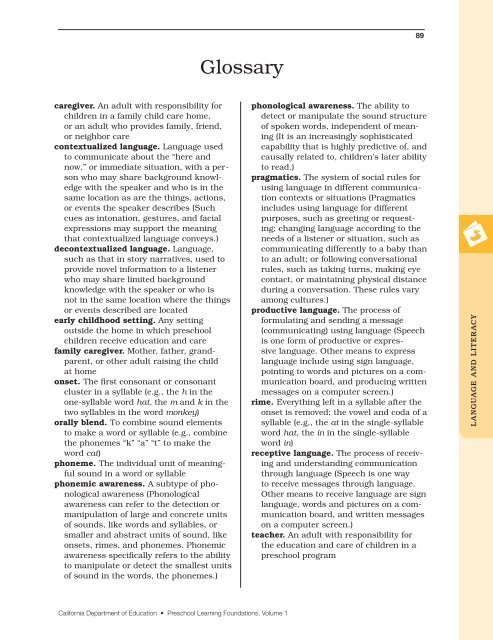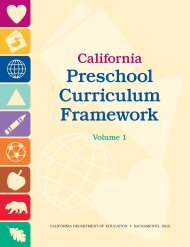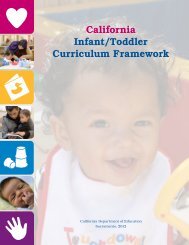California Preschool Learning Foundations - ECEZero2Three ...
California Preschool Learning Foundations - ECEZero2Three ...
California Preschool Learning Foundations - ECEZero2Three ...
Create successful ePaper yourself
Turn your PDF publications into a flip-book with our unique Google optimized e-Paper software.
caregiver. An adult with responsibility for<br />
children in a family child care home,<br />
or an adult who provides family, friend,<br />
or neighbor care<br />
contextualized language. Language used<br />
to communicate about the “here and<br />
now,” or immediate situation, with a person<br />
who may share background knowledge<br />
with the speaker and who is in the<br />
same location as are the things, actions,<br />
or events the speaker describes (Such<br />
cues as intonation, gestures, and facial<br />
expressions may support the meaning<br />
that contextualized language conveys.)<br />
decontextualized language. Language,<br />
such as that in story narratives, used to<br />
provide novel information to a listener<br />
who may share limited background<br />
knowledge with the speaker or who is<br />
not in the same location where the things<br />
or events described are located<br />
early childhood setting. Any setting<br />
outside the home in which preschool<br />
children receive education and care<br />
family caregiver. Mother, father, grandparent,<br />
or other adult raising the child<br />
at home<br />
onset. The first consonant or consonant<br />
cluster in a syllable (e.g., the h in the<br />
one-syllable word hat, the m and k in the<br />
two syllables in the word monkey)<br />
orally blend. To combine sound elements<br />
to make a word or syllable (e.g., combine<br />
the phonemes “k” “a” “t” to make the<br />
word cat)<br />
phoneme. The individual unit of meaningful<br />
sound in a word or syllable<br />
phonemic awareness. A subtype of phonological<br />
awareness (Phonological<br />
awareness can refer to the detection or<br />
manipulation of large and concrete units<br />
of sounds, like words and syllables, or<br />
smaller and abstract units of sound, like<br />
onsets, rimes, and phonemes. Phonemic<br />
awareness specifically refers to the ability<br />
to manipulate or detect the smallest units<br />
of sound in the words, the phonemes.)<br />
Glossary<br />
<strong>California</strong> Department of Education • <strong>Preschool</strong> <strong>Learning</strong> <strong>Foundations</strong>, Volume 1<br />
89<br />
phonological awareness. The ability to<br />
detect or manipulate the sound structure<br />
of spoken words, independent of meaning<br />
(It is an increasingly sophisticated<br />
capability that is highly predictive of, and<br />
causally related to, children’s later ability<br />
to read.)<br />
pragmatics. The system of social rules for<br />
using language in different communication<br />
contexts or situations (Pragmatics<br />
includes using language for different<br />
purposes, such as greeting or requesting;<br />
changing language according to the<br />
needs of a listener or situation, such as<br />
communicating differently to a baby than<br />
to an adult; or following conversational<br />
rules, such as taking turns, making eye<br />
contact, or maintaining physical distance<br />
during a conversation. These rules vary<br />
among cultures.)<br />
productive language. The process of<br />
formulating and sending a message<br />
(communicating) using language (Speech<br />
is one form of productive or expressive<br />
language. Other means to express<br />
language include using sign language,<br />
pointing to words and pictures on a communication<br />
board, and producing written<br />
messages on a computer screen.)<br />
rime. Everything left in a syllable after the<br />
onset is removed; the vowel and coda of a<br />
syllable (e.g., the at in the single-syllable<br />
word hat, the in in the single-syllable<br />
word in)<br />
receptive language. The process of receiving<br />
and understanding communication<br />
through language (Speech is one way<br />
to receive messages through language.<br />
Other means to receive language are sign<br />
language, words and pictures on a communication<br />
board, and written messages<br />
on a computer screen.)<br />
teacher. An adult with responsibility for<br />
the education and care of children in a<br />
preschool program<br />
LANGUAGE AND LITERACY
















